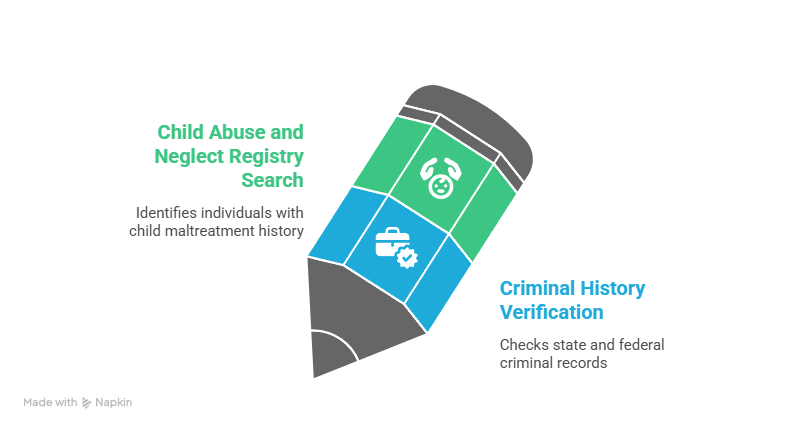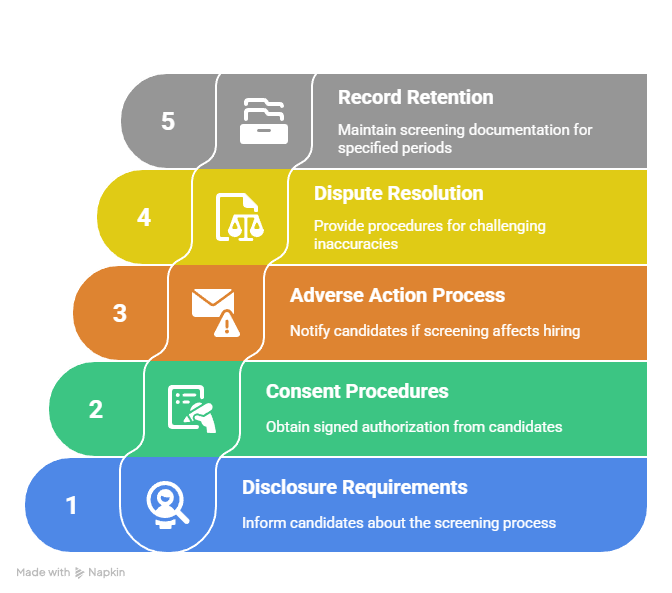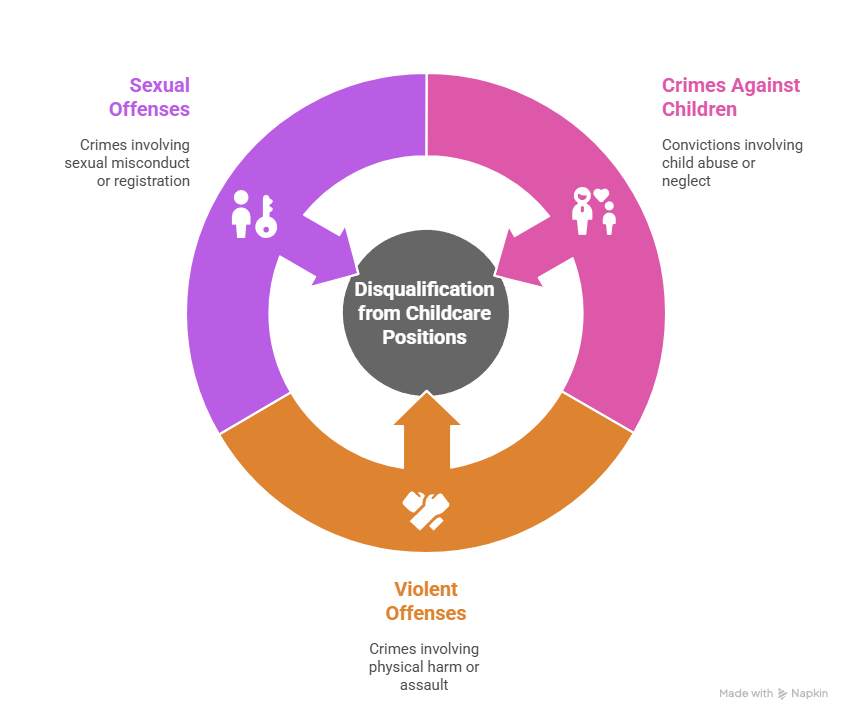Florida nanny background check requirements involve multiple screening components including criminal history verification, child abuse registry searches, and employment verification. However, the state doesn't mandate specific background check standards for private household employers.
Key Takeaways
- Florida law doesn't require private families to conduct background checks on nannies, but many employers choose comprehensive screening for child safety reasons.
- Criminal background checks should include both state and federal databases, with particular attention to crimes involving children, violence, or drugs.
- The Florida Department of Children and Families maintains a child abuse and neglect registry that employers can access for screening purposes.
- Nanny candidates have rights under the Fair Credit Reporting Act (FCRA) when background checks are conducted by third-party agencies.
- Professional nanny agencies typically conduct more extensive background screening than individual families hiring independently.
- Reference checks and employment verification remain crucial components alongside formal background screening processes.
Understanding Florida's Legal Framework for Nanny Background Checks
Florida operates under a unique regulatory environment regarding domestic worker screening. Unlike licensed childcare facilities, private families hiring nannies face no state-mandated background check requirements. Nevertheless, this freedom comes with significant responsibility for ensuring child safety.
The Florida Department of Children and Families oversees licensed childcare providers. These providers must complete Level 2 background screenings. Additionally, these comprehensive checks include fingerprinting, criminal history searches, and child abuse registry verification. While private employers aren't bound by these same requirements, many adopt similar standards voluntarily.
Understanding this legal landscape helps both employers and job seekers navigate expectations appropriately. Furthermore, private families maintain discretion over screening depth, while nanny candidates should prepare for varying requirements across different employers.
Essential Components of Florida Nanny Background Screening

Criminal History Verification
Florida's criminal background check system operates through the Florida Department of Law Enforcement (FDLE). Moreover, this system provides access to state criminal records. Comprehensive screening should include both misdemeanor and felony convictions. Additionally, employers should pay particular attention to offenses involving children, domestic violence, theft, or substance abuse.
Federal criminal database searches complement state-level checks. Consequently, these searches capture crimes committed outside Florida. The FBI's National Crime Information Center provides nationwide criminal history data that may not appear in state-only searches.
Child Abuse and Neglect Registry Search
The Florida Abuse Hotline Information System maintains records of substantiated child abuse and neglect cases. Therefore, employers can request searches of this database to identify individuals with documented histories of child maltreatment. This screening component proves especially critical for childcare positions.
Access to this registry requires specific procedures and forms. Furthermore, these searches are typically handled through professional screening companies or legal channels. The information revealed through these searches carries significant weight in hiring decisions.
Professional vs. Independent Background Check Processes
| Screening Method | Typical Components | Cost Range | Turnaround Time |
| Professional Agency | Criminal, abuse registry, references, drug testing | $75-$200 | 3-7 business days |
| DIY Family Screening | Basic criminal check, personal references | $25-$75 | 1-5 business days |
Professional nanny placement agencies typically conduct the most thorough background screenings. These agencies often include drug testing, comprehensive reference verification, and detailed employment history confirmation. As a result, the investment in professional screening provides families with greater confidence and liability protection.
Independent screening by families offers more control over the process. However, it requires greater diligence in execution. Families choosing this route must navigate various databases and verification procedures themselves. Consequently, they may potentially miss critical information sources.
FCRA Compliance and Legal Considerations
The Fair Credit Reporting Act governs background check procedures when third-party screening companies are involved. Florida employers must provide written disclosure before conducting background checks. Additionally, they must obtain written consent from nanny candidates. Furthermore, adverse hiring decisions based on background check results require specific notification procedures.
Key FCRA requirements include:

- Disclosure Requirements: Clear written notification before screening
- Consent Procedures: Signed authorization from the candidate
- Adverse Action Process: Formal notification if background check influences hiring decisions
- Dispute Resolution: Procedures for candidates to challenge inaccurate information
- Record Retention: Maintaining screening documentation for specified periods
Understanding these requirements protects employers from potential legal challenges. Moreover, it ensures fair treatment of job seekers. Violations can result in significant financial penalties and legal complications.
Cost Factors and Budget Planning
Background check costs vary significantly based on scope and methodology. Basic criminal history searches through commercial databases typically cost $20-$50 per candidate. In contrast, comprehensive screening including multiple databases, reference verification, and specialized searches can range from $100-$300.
Factors influencing background check costs include database coverage and search depth. Additionally, professional services versus DIY screening affects pricing. Other factors include additional components like drug testing and turnaround speed requirements.
- Database Coverage: State-only vs. national searches
- Search Depth: Basic criminal vs. comprehensive screening
- Professional Services: DIY vs. agency-conducted screening
- Additional Components: Drug testing, education verification, credit checks
- Turnaround Speed: Standard vs. expedited processing
Families should budget appropriately for thorough screening while considering the long-term value of comprehensive background verification. Therefore, the cost of proper screening often proves minimal compared to potential risks of inadequate vetting.
Red Flags and Disqualifying Factors
Certain criminal convictions and background elements should raise immediate concerns for families hiring nannies. Understanding these red flags helps employers make informed decisions. Furthermore, it helps maintain appropriate standards for child safety.
Critical disqualifying factors typically include crimes against children and violent offenses. Additionally, sexual offenses and drug-related convictions raise serious concerns. Moreover, theft or fraud convictions indicate dishonesty or untrustworthiness issues.

- Crimes Against Children: Any conviction involving child abuse, neglect, or exploitation creates serious safety concerns. These offenses directly relate to childcare responsibilities. Therefore, they typically result in automatic disqualification.
- Violent Offenses: Assault, domestic violence, or other crimes involving physical harm raise red flags. These convictions suggest potential danger to children and families. Consequently, most employers consider them disqualifying factors.
- Sexual Offenses: Any sex crime conviction or sex offender registration creates immediate concerns. These offenses pose direct risks to child safety. As a result, they typically result in automatic disqualification from childcare positions.
Less serious offenses may warrant individual consideration based on several factors. Time elapsed since the offense matters significantly. Additionally, evidence of rehabilitation and offense relevance to childcare responsibilities influence decisions. Traffic violations and minor infractions typically don't disqualify candidates automatically.
Reference Verification and Employment History
Background screening extends beyond criminal databases to include comprehensive reference verification. Professional references from previous childcare positions provide valuable insights. Therefore, they reveal work quality, reliability, and interpersonal skills that criminal checks cannot show.
Effective reference verification should include previous employers and professional references. Additionally, personal references and education verification provide comprehensive coverage. Moreover, explanations for employment gaps help create a complete picture.
| Reference Type | Information Gained | Typical Response Rate |
| Previous Employers | Work performance, reliability, reason for leaving | 70-80% |
| Professional References | Skills assessment, character evaluation | 85-90% |
| Personal References | Character insights, personal qualities | 90-95% |
Employment history verification helps identify patterns of job stability. Furthermore, it reveals reasons for position changes and overall career trajectory. This information proves valuable for assessing candidate suitability beyond criminal history considerations.
Timeline and Processing Expectations
Background check completion times vary based on scope, methodology, and current processing volumes. Basic criminal database searches often complete within 24-48 hours. However, comprehensive screening including reference verification may require 5-10 business days.
Planning adequate time for background screening prevents hiring delays. Moreover, it ensures thorough vetting without rushing the process. Rush processing may be available for additional fees. Nevertheless, it could compromise screening completeness and accuracy.
State criminal checks typically process fastest due to automated database systems. Federal searches take longer because of FBI processing requirements. Additionally, reference verification depends on contact availability and response rates.
Sex Offender Registry and Database Searches
Florida's sex offender registry provides public access to offender information. The Florida Department of Law Enforcement maintains this database. Additionally, it includes current addresses, photos, and conviction details for registered individuals.
National sex offender database searches expand coverage beyond Florida's borders. These searches capture registrations from other states. Therefore, they prove essential for comprehensive screening, given the mobile nature of many domestic workers.
The registry search process is straightforward and typically free for public access. However, professional screening services often provide more comprehensive multi-state searches. Furthermore, they can integrate this information with other background check components for complete reporting.
Documentation and Record Keeping
Proper documentation of background check procedures protects employers legally. Additionally, it maintains organized hiring records for future reference. Florida employers should retain screening documentation, consent forms, and decision rationale appropriately.
Essential documentation includes signed consent forms and complete screening reports. Moreover, detailed reference notes and decision documentation prove crucial. Furthermore, compliance records demonstrate adherence to legal requirements.
- Signed Consent Forms: FCRA-compliant authorization documents protect against legal challenges. These forms must be obtained before screening begins. Additionally, they should clearly explain the screening process and candidate rights.
- Screening Reports: Complete background check results provide comprehensive candidate information. These reports should include all database searches and findings. Moreover, they serve as permanent hiring decision records.
- Reference Notes: Detailed records of reference conversations preserve important feedback. These notes should include specific comments about performance and character. Furthermore, they help justify hiring decisions if questioned later.
Maintaining organized records demonstrates due diligence in hiring practices. Therefore, it provides protection in case of future legal challenges or insurance claims. Additionally, proper documentation helps track screening effectiveness over time.
Conclusion
Florida nanny background check requirements reflect a balance between family autonomy and child safety considerations. While state law doesn't mandate specific screening procedures for private employers, comprehensive background verification remains crucial. Successful screening combines criminal database searches, registry verification, and thorough reference checking. Understanding legal compliance requirements protects both employers and job seekers while ensuring child safety remains the top priority.
Frequently Asked Questions
Are Florida families legally required to conduct background checks on nannies?
No, Florida law doesn't require private families to conduct background checks on nannies or other domestic workers. However, many families choose to do so for safety and peace of mind.
How much should I expect to pay for a comprehensive nanny background check in Florida?
Comprehensive background checks typically cost between $75-$200, depending on the scope of screening. Basic criminal checks may cost $25-$50, while extensive screening with drug testing and detailed reference verification can reach $300.
Can I conduct a background check on a nanny myself, or do I need a professional service?
You can conduct basic background screening yourself using public databases and reference checks. However, professional services often provide more comprehensive coverage and ensure FCRA compliance when using third-party reporting agencies.
What crimes would automatically disqualify someone from working as a nanny in Florida?
While Florida doesn't specify automatic disqualifiers for private nanny positions, most families consider crimes against children, violent offenses, sex crimes, and recent drug-related convictions as disqualifying factors.
How long do background checks take to complete in Florida?
Basic criminal checks typically complete in 1-3 business days, while comprehensive screening including reference verification may take 5-10 business days. Expedited processing may be available for additional fees.
Do I need the nanny's permission before running a background check?
Yes, if you're using a third-party background check service, you must provide written disclosure and obtain written consent before screening under the Fair Credit Reporting Act (FCRA).
Can a nanny refuse a background check in Florida?
Yes, nanny candidates can refuse background checks, but employers are also free to make background screening a condition of employment. Most professional nannies expect and willingly participate in background screening processes.
What should I do if a background check reveals concerning information?
Evaluate the information's relevance to childcare responsibilities, considering factors like time elapsed, offense severity, and rehabilitation evidence. If using a third-party screening service, follow FCRA adverse action procedures if the information influences your hiring decision.
Additional Resources
- Florida Department of Law Enforcement Background Check Services
https://www.fdle.state.fl.us/Criminal-History-Records/ - Florida Department of Children and Families Child Abuse Registry
https://www.myflfamilies.com/service-programs/abuse-hotline/ - Fair Credit Reporting Act Compliance Guide
https://www.ftc.gov/business-guidance/resources/using-consumer-reports-what-employers-need-know - Florida Sex Offender Registry Search
https://offender.fdle.state.fl.us/offender/sops/home.jsf - National Association of Professional Background Screeners
https://www.napbs.com/ - U.S. Consumer Financial Protection Bureau FCRA Resources
https://www.consumerfinance.gov/compliance/compliance-resources/other-applicable-law/fair-credit-reporting-act/
